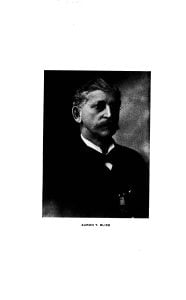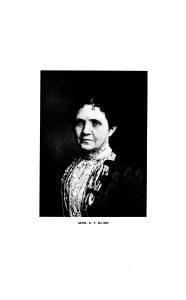Colonel Aaron T. Bliss was a distinguished lumberman, Civil War hero, and political figure from Saginaw Valley. Born in New York in 1837 to a family with deep English roots, he became a successful businessman, co-founding A.T. Bliss & Company after overcoming hardships including six months as a prisoner of war. Bliss’s political career flourished as he served as a state senator, Congressman, and two-term Governor of Michigan. He contributed significantly to his community, supporting charitable causes, education, and the Methodist Church. Bliss passed away in 1906, leaving a legacy of wealth creation, patriotic service, and political achievement, and was honored with state and military funerals.

Of the prominent lumbermen and representative citizens of the Saginaw Valley, few have been more widely known in both business and political circles than Colonel Aaron T. Bliss. He was born at Peterboro, Madison County, New York, May 22, 1837, and came from a long line of English ancestry. His father, Lyman Bliss, traced the genealogy of his family as far as 1550; and his mother, who was Anna Chaffee Bliss, of Smithfield, New York, was also of English descent.
Brought up on the old homestead farm, the son Aaron was early inured to the hard work and toil incident to rural life. His early education was obtained in the district school of the neighborhood, which, during the brief winter term, offered but meager talent for instruction. Before he was sixteen he therefore left the farm home and went to Morrisville, New York, where he worked for fourteen months in a grocery store, receiving in payment for his services $100 and a suit of clothes. This money he used to pay the tuition of a four months’ term in a select school in Munnsville, meanwhile paying for his board by doing chores and odd jobs about the town on Saturdays and other spare time.
He afterward engaged as clerk in a store at Bouckville, Madison County, and on account of his experience in the business, was allowed $125 a year. He remained in this store until twenty years of age, when he was taken into the firm, under the name of Burnham & Bliss. With the habit of industry applied to the practical purposes of life, his leisure hours were spent in reading and study which promoted in after years a broad grasp of the questions of the day.
On the outbreak of the Civil War Aaron T. Bliss was among the first to respond to the call which summoned the patriots of the land to its defence. The patriotic spirit of his ancestry found expression in his enlisting on October 1, 1861, with the gallant band which as the Peterman Guards of the Tenth New York Cavalry, reported for duty at Elmira, New York. At first he was a non-commissioned officer, but speedily advanced to the rank of Lieutenant. For a time his regiment formed a part of Kilpatrick’s Brigade. Ordered to the front and joining the Army of the Potomac, he took part in the second battle of Bull Run, commanding the detailed squadron from Washington, and was thereupon made Captain.
He participated in the battle of Fredericksburg, the Wilderness, Petersburg, Groundsquirrel Church, Stony Creek, South Mountain, Falls Church and Warrenton. On General Wilson’s raid near Richmond, after being out eight days, he was captured on the following morning while returning, and imprisoned at Salisbury, North Carolina. Afterward taken to Columbia, Andersonville and Macon, he was one of the six hundred officers placed under fire of the Union forces at Charleston, S. C.; and suffered the discomforts and privations of prison life, and experienced all the horrors which were so grievous a blot upon the Southern escutcheon. Being transferred to the stockade at Columbia, he succeeded in making his escape on the 29th of November, 1864, and after eighteen days and nights on the road reached Sherman’s Army at Savannah two days before the evacuation of that city. Soon after he rejoined his own command which was then at Petersburg, Virginia, where he remained until the close of the war. He was in active service for three years, and spent six months of hardship in the prison pens when, upon close of hostilities, he was honorably discharged and returned to his home.
In 1865 Mr. Bliss removed to Saginaw and during the fall and winter worked in the logging camps on the Tobacco River; and the following summer found employment in a shingle mill. In company with his brother, Lyman W. Bliss, and J. H. Jerome, he then formed the partnership of A. T. Bliss & Company, and took a contract for cutting and skidding a quantity of logs upon lands adjacent to the Tobacco. Though they had but three teams with which to prosecute the work, the venture was successful; and in the spring of 1868 the brothers, Aaron and Lyman, bought the Jerome mill at Zilwaukee, with a capacity of 9,000,000 feet per year.

During this year Mr. Bliss was married to Miss Almira M. Phelps, of Solsville, Madison County, New York. In this day with the struggling firm she, like many Rachels whom the lumber business developed, did not scorn to render aid in the oversight of the mill boarding house, and in the economical use of the various supplies which such an operation demands. She cheered him on in what was but too often a day of darkness and exhaustive struggle, and enabled each in the days of prosperity which followed to feel that the goal had been reached by the united efforts of both.
For many years Mrs. Bliss has been prominently identified with our leading charitable institutions; and is a member and liberal supporter of the First Methodist Church, contributing generously to the fund for building the present edifice on South Michigan Avenue. She was one of the founders and for many years a member of the board of directors of Saginaw General Hospital, and has served as director of the Home for the Friendless. The office of state president of the Woman’s Relief Corps was held by Mrs. Bliss for several years, as also that of national officer of the same organization. During the administration of Governor Rich she was appointed president of the board of control of the International Home for Girls at Adrian, and was the only woman to hold an appointive office during his term. She has also served on the National Board of Charities and Corrections.
As years passed the firm of A. T. Bliss & Brother prospered and continued to increase its volume of business, purchasing large tracts of pine land on the Tobacco and Tittabawassee Rivers, and also with others becoming interested in tracts of land in Clare County. With George C. Sanborn and Isaac Bearinger, Mr. Bliss purchased the “Litchfield Mill” at Carrollton, which they stocked and operated. Later Mr. Bearinger sold his interest to his partners, and in 1887 Mr. Sanborn died, when, with his nephews, A. P. Bliss and A. T. Brown, a new co-partnership was formed to operate the Zilwaukee mill. About this time he, in company with Lyman and Charles S. Bliss, bought the Shaw & Williams mill at the west end of the F. & P. M. bridge, which was operated until it was burned in 1890.
Mr. Bliss was also prominent in banking circles, was one of the organizers and a director of the Citizen’s National Bank, promoted in 1880 and which was afterward reorganized into the Bank of Saginaw, and was president and director of the Saginaw County Savings Bank. Among his associates he was regarded as a very level-headed business man of keen mind and sound judgment, capable of grasping large enterprises and carrying them to successful conclusions.
In politics Colonel Bliss was a stanch Republican, and exercised an extended influence in state as well as local affairs. At an early day he was a member of the common council of Saginaw City, holding office for four years, and was likewise a member of the board of supervisors. In the fall of 1882 he was elected to the State Senate, and proved to be a practical and efficient member, being largely instrumental in securing the establishment of the Soldiers’ Home at Grand Rapids. On the election of General Alger as governor, Mr. Bliss was appointed a member of his staff, with the rank of Colonel.
In 1888 he was sent to Congress to represent his district in the lower house, and the bills he introduced, notably one appropriating $100,000 for a federal building in Saginaw, were important to the interests of his constituents, and to the State at large. Among these bills was one appropriating $25,000 for an Indian school at Mt. Pleasant.
At the general election of 1900 Mr. Bliss was elected governor of Michigan, and held that high office for two terms. During his able administration and by his indefatigable efforts, the Michigan Employment Institution for the Adult Blind was established at Saginaw, on a site facing beautiful Bliss Park, one of his many benefactions to his home city.
His acts of munificence were never stinted and no worthy charity or philanthropy appealed to him in vain. He was a patron of the Home for the Friendless, the Y. M. C. A., and Albion College, to which he gave large sums; and was a liberal supporter of the Methodist Church.
On August 31, 1905, while on a train en route for Denver to attend the National Encampment of the G. A. R., the Colonel suffered a slight stroke and was taken back immediately to his home. Although he recovered and attended to his business affairs with almost his usual vigor, he gradually failed in health. In the summer of 1906 he sought relief in a sanitarium in Milwaukee. But early in the morning of the sixteenth of September, without warning he suddenly expired. He was buried with State and military honors at Forest Lawn in his home city, the services being conducted by St. Bernard Commandery, No. 16, K. T., of which he was an old and honored member.
His life, viewed as a whole, was devoted to three ambitions — the creation of wealth, patriotic service of his country, and attainment of political honors, and in all he was eminently successful.
